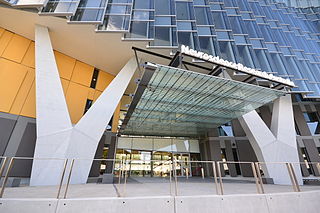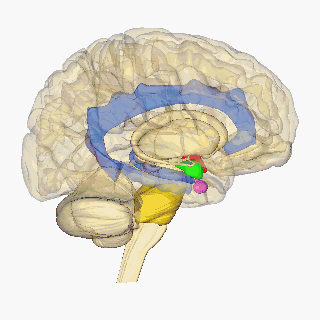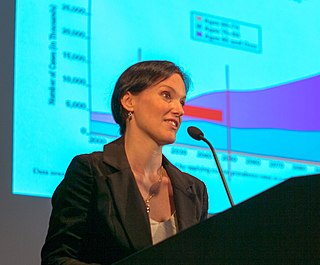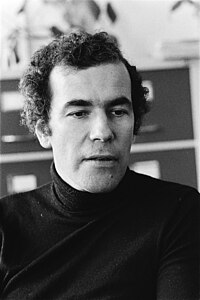
The relationship between biology and sexual orientation is a subject of on-going research. While scientists do not know the exact cause of sexual orientation, they theorize that it is caused by a complex interplay of genetic, hormonal, and environmental influences. However, evidence is weak for hypotheses that the post-natal social environment impacts sexual orientation, especially for males.

The hypothalamus is a small part of the brain that contains a number of nuclei with a variety of functions. One of the most important functions is to link the nervous system to the endocrine system via the pituitary gland. The hypothalamus is located below the thalamus and is part of the limbic system. It forms the ventral part of the diencephalon. All vertebrate brains contain a hypothalamus. In humans, it is the size of an almond.

The Florey Institute of Neuroscience and Mental Health, more commonly known as The Florey, is an Australian medical research institute that undertakes research into treatments for brain and mind disorders. The institute's areas of interest include Parkinson's disease, stroke, motor neurone disease, addiction, epilepsy, multiple sclerosis, Autism, Huntington's disease, depression, schizophrenia, brain function in health and disease, heart failure, and dementia.
Gender incongruence is the state of having a gender identity that does not correspond to one's sex assigned at birth. This is experienced by people who identify as transgender or transsexual, and often results in gender dysphoria. The causes of gender incongruence have been studied for decades.
Trevor William RobbinsCBE FRS FMedSci is a professor of cognitive neuroscience and the former Head of the Department of Psychology at the University of Cambridge. Robbins interests are in the fields of cognitive neuroscience, behavioural neuroscience and psychopharmacology.

Sexual orientation is an enduring pattern of romantic or sexual attraction to persons of the opposite sex or gender, the same sex or gender, or to both sexes or more than one gender, or none of the aforementioned at all. The ultimate causes and mechanisms of sexual orientation development in humans remain unclear and many theories are speculative and controversial. However, advances in neuroscience explain and illustrate characteristics linked to sexual orientation. Studies have explored structural neural-correlates, functional and/or cognitive relationships, and developmental theories relating to sexual orientation in humans.

Neuroscience Research Australia is an independent medical research institute based in Sydney, Australia. Previously called the Prince of Wales Medical Research Institute, the institute relaunched as Neuroscience Research Australia on 1 June 2010. NeuRA is accredited by the National Health and Medical Research Council.
The Human Connectome Project (HCP) is a five-year project sponsored by sixteen components of the National Institutes of Health, split between two consortia of research institutions. The project was launched in July 2009 as the first of three Grand Challenges of the NIH's Blueprint for Neuroscience Research. On September 15, 2010, the NIH announced that it would award two grants: $30 million over five years to a consortium led by Washington University in St. Louis and the University of Minnesota, with strong contributions from University of Oxford (FMRIB) and $8.5 million over three years to a consortium led by Harvard University, Massachusetts General Hospital and the University of California Los Angeles.

The hormonal theory of sexuality holds that, just as exposure to certain hormones plays a role in fetal sex differentiation, such exposure also influences the sexual orientation that emerges later in the individual. Prenatal hormones may be seen as the primary determinant of adult sexual orientation, or a co-factor with genes, biological factors and/or environmental and social conditions.

Pim van Lommel is a Dutch author and researcher in the field of near-death studies.

The neuroscience of sex differences is the study of characteristics that separate brains of different sexes. Psychological sex differences are thought by some to reflect the interaction of genes, hormones, and social learning on brain development throughout the lifespan.

Katya Rubia is a professor of Cognitive Neuroscience at the MRC Social, Genetic and Developmental Psychiatry Centre and Department of Child and Adolescent Psychiatry, both part of the Institute of Psychiatry, King's College London.

Giovanna Rachele Mallucci is van Geest Professor of Clinical Neurosciences at the University of Cambridge in England and associate director of the UK Dementia Research Institute at the University of Cambridge. She is a specialist in neurodegenerative diseases.

Eveline Crone is a Dutch professor of cognitive neuroscience and developmental psychology at Leiden University. Her research focuses on risky behaviors in adolescent humans during puberty and examines the function of those risks. For her research in adolescent brain development and behaviour, she was awarded the Spinoza Prize, the highest recognition for Dutch scientists, in 2017.
Roshan Cools is a Professor of Cognitive Neuropsychiatry at Radboud University Nijmegen. She is interested in the motivational and cognitive control of human behaviour and how it is impacted by neuromodulation. She was elected to the Royal Netherlands Academy of Arts and Sciences in 2018.
Herman Meïr van Praag is a Dutch psychiatrist. He was a professor of psychiatry at the University of Groningen, Utrecht University, Albert Einstein College of Medicine and Maastricht University. Van Praag is considered the founder of biological psychiatry in the Netherlands. After his retirement, he has written extensively on religiosity.
The Center of Expertise on Gender Dysphoria (CEGD), or the Kennis- en Zorgcentrum Genderdysforie (KZcG), is a transgender clinic at Amsterdam University Medical Centers, location VUmc in Amsterdam, Netherlands. It opened in 1972 and is one of the largest transgender clinics and research institutes in the world. As of 2021, it has treated about 10,000 transgender people since it opened almost 50 years previously. The clinic was first headed by Louis Gooren.

The Robert J. & Nancy D. Carney Institute for Brain Science is a cross-departamental neuroscience research institute at Brown University in Providence, Rhode Island. The institute's core focus areas include brain-computer interfaces and computational neuroscience The institute also focuses on research into mechanisms of cell death with the interest of developing therapies for neurodegenerative diseases.

Lisa Mosconi is an Italian American neuroscientist, educator, and author known for her books The XX Brain and Brain Food. She is the Director of the Women’s Brain Initiative and Director of the Alzheimer’s Prevention Clinic, both at Weill Cornell Medical College where she is an Associate Professor of Neuroscience in Neurology.












